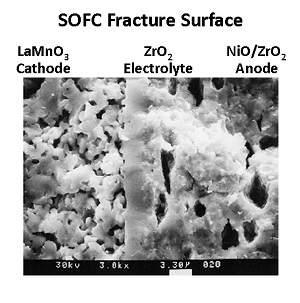FUEL CELLS

Fuel cells are devices that produce energy through a chemical reaction between a fuel, usually hydrogen, and an oxidizing agent. They are different from batteries in that they require a constant source of fuel, and will never stop producing electricity as long as the supply continues. Fuel cells are commonly stacked on top of each other to increase overall energy production. One advantage of fuel cells is that their byproducts don’t produce much pollution.
CER studies a type of fuel cell called a solid oxide fuel cell (SOFC), and focuses on three areas:
- Fundamental research on cell components and cell-stacks
- Experimental and theoretical studies to solve key performance and stability issues
- Development of innovative concepts to reduce cost, improve durability, and increase SOFC system efficiency.
